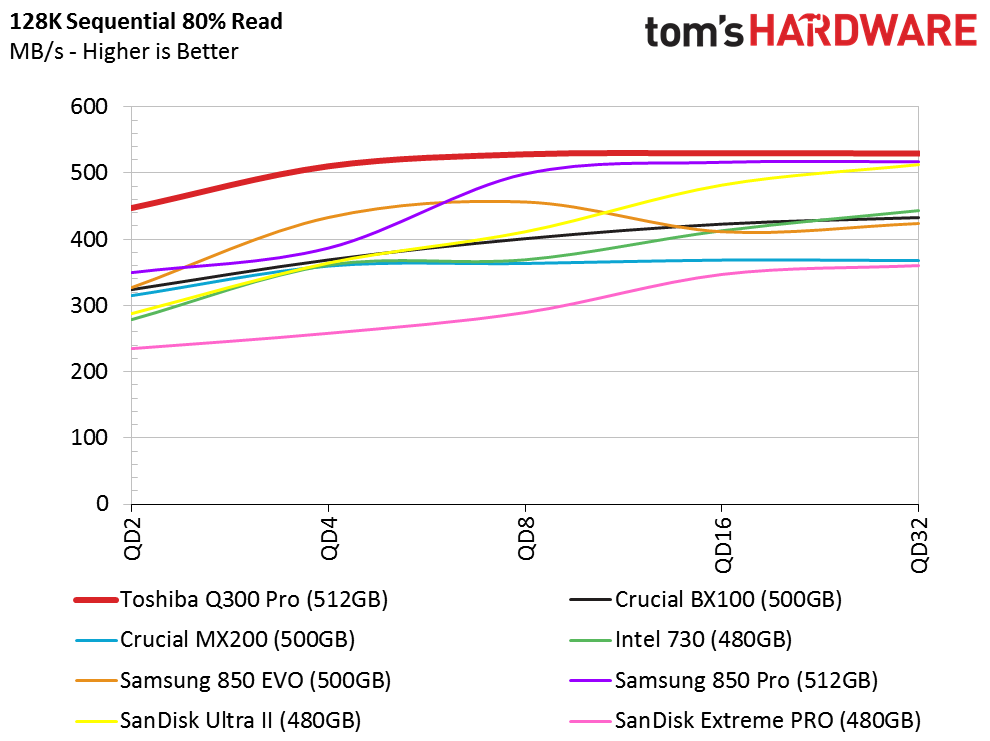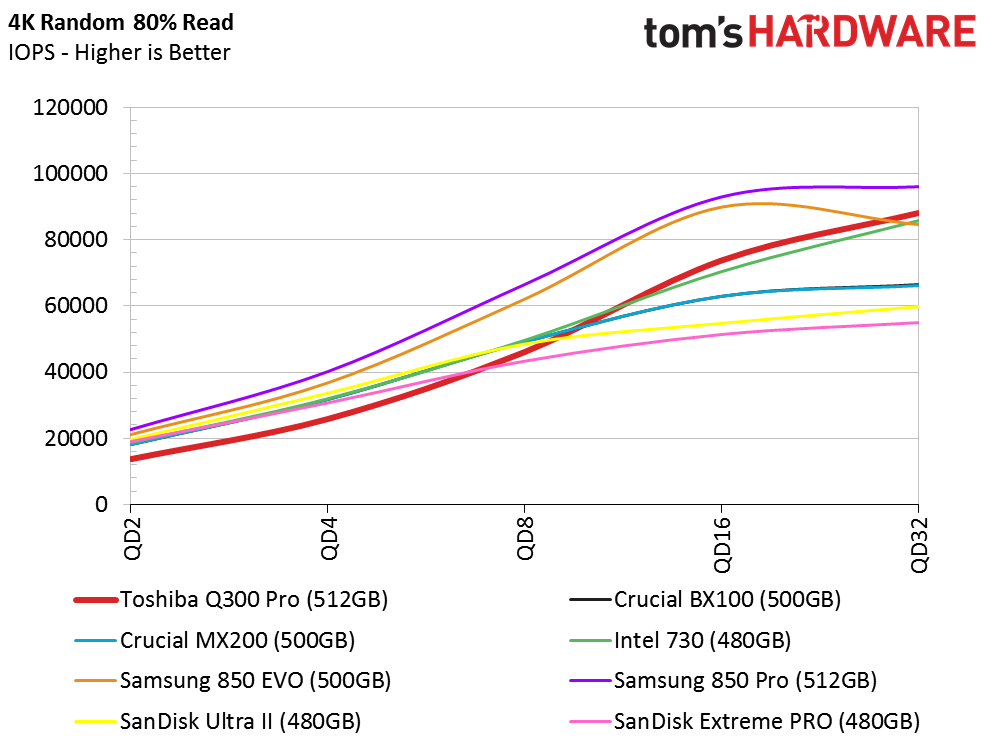Toshiba Q300 Pro 512GB MLC SSD Review
Toshiba recently launched two new SSDs for the entry-level and mainstream markets. Today, we look at the top-tier MLC-based Q300 Pro and find that it could be a serious contender in the market.
Why you can trust Tom's Hardware
Mixed Workload And Steady State
80 Percent Sequential Mixed Workload
In the past, we've talked about how companies tune SSDs for real-world tasks, and how those optimizations rarely show up in 100 percent read or write workloads under synthetic testing. Toshiba's Q300 Pro gives us a clear example of this, demonstrating why these results are so important to measure. Later we'll see how they map over to real-world software.
80 Percent Random Mixed Workload
Random performance, even in the context of a mixed workload, is still problematic for the Q300 Pro. Without a DRAM buffer, the controller simply can't be tuned to deliver the same performance as drives with fast cache.
Sequential Steady State
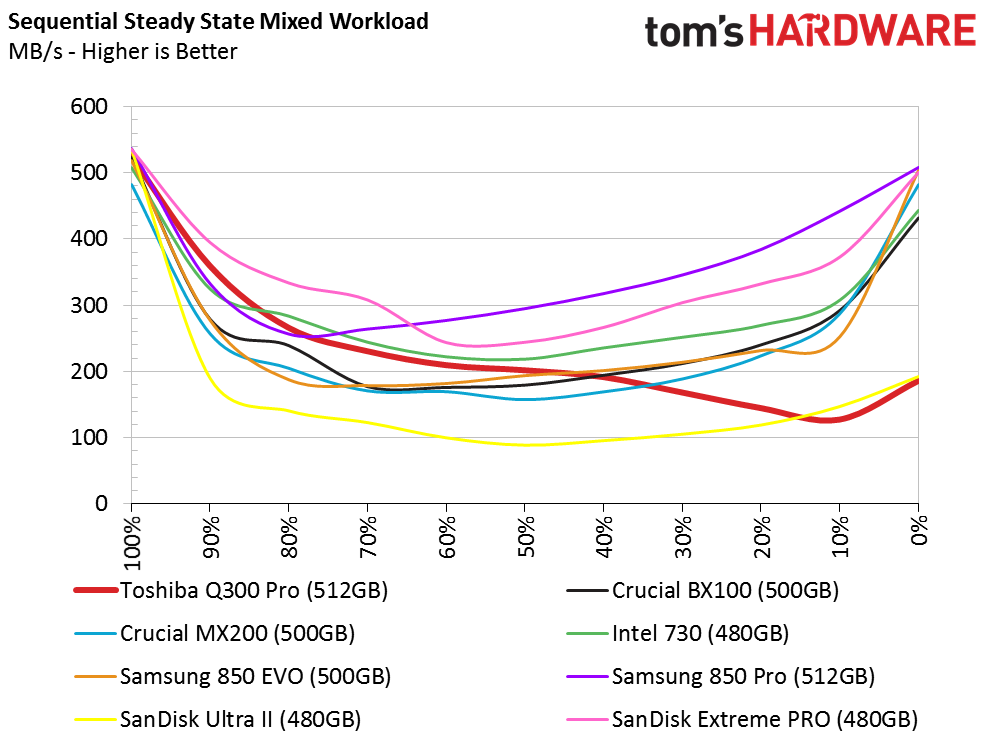
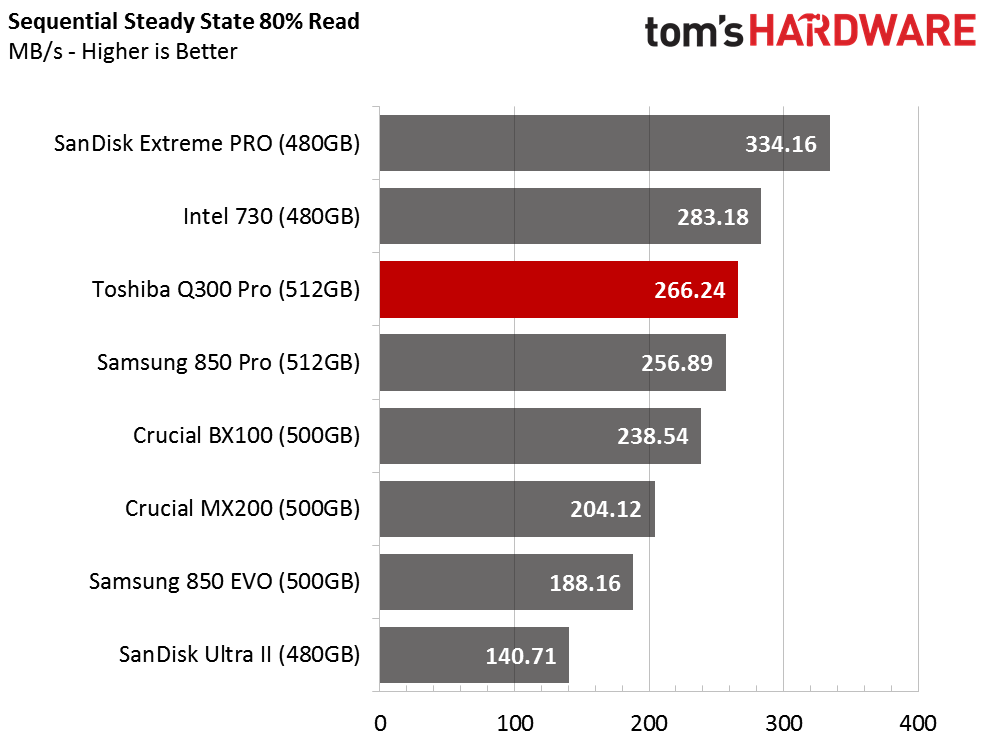
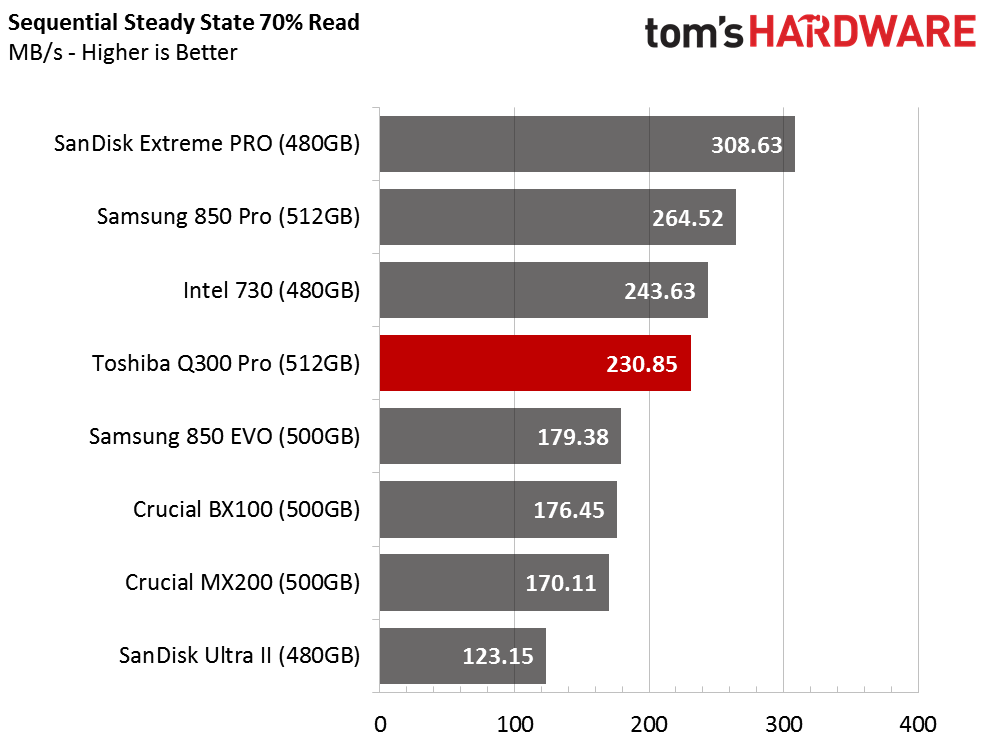
As the chart moves right, writes are added to the mix of reads. The lack of DRAM exposes sequential transfers we normally associate with single-plane TLC flash in a steady state condition. That is to say the Q300 Pro has trouble writing data quickly. The safety mode we saw triggered earlier likely plays a role here, as this drive wasn't designed for such taxing workloads. When it's almost full, expect it to slow significantly.
Random Write Steady State
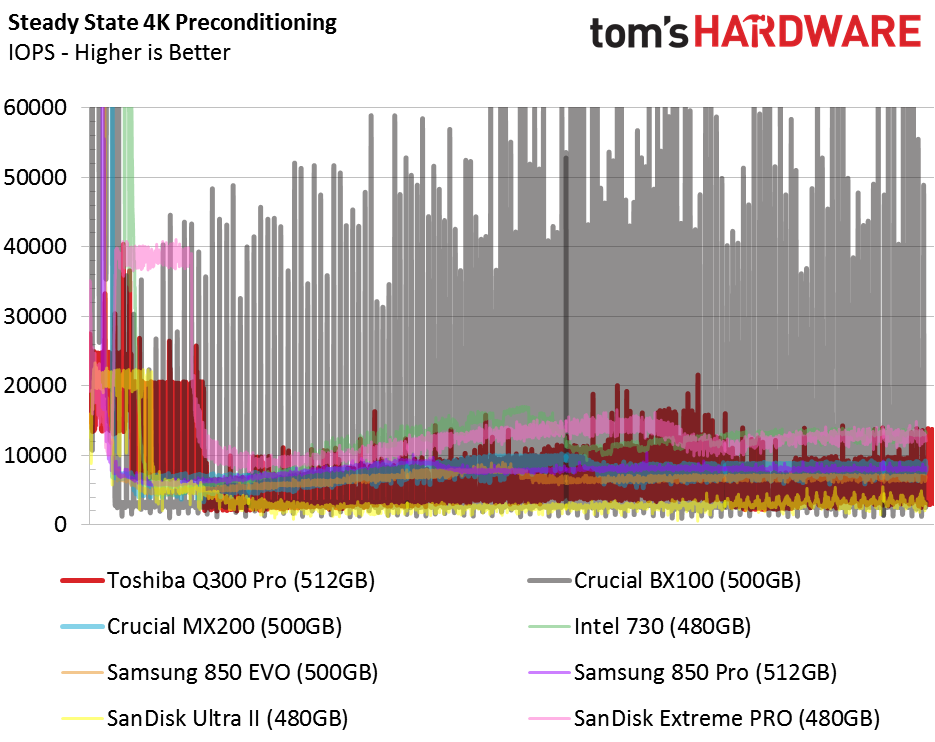
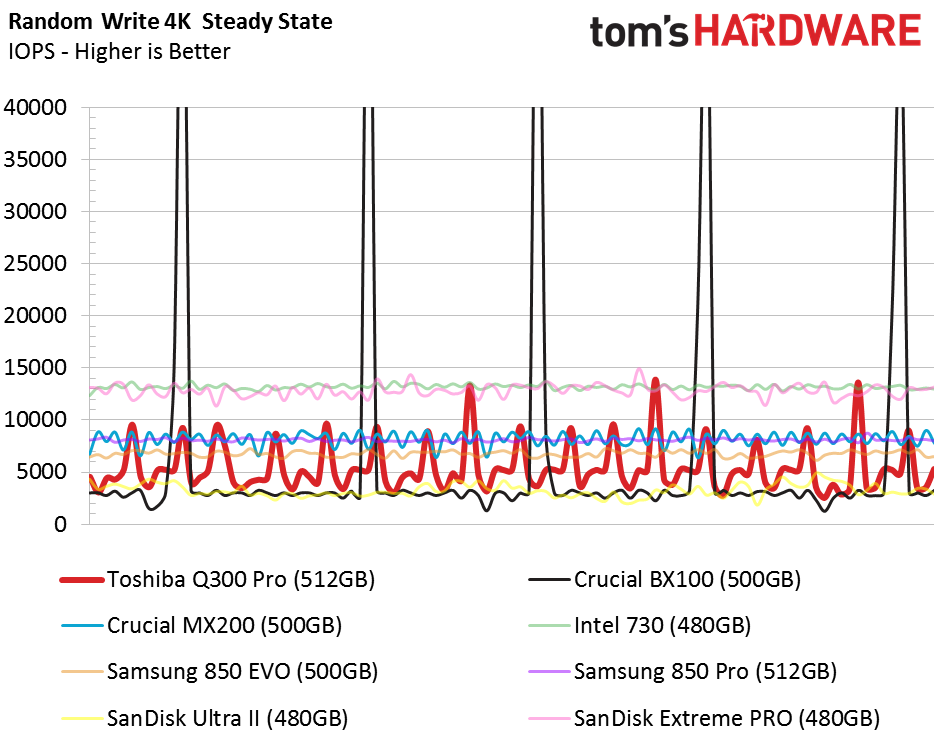
Most enthusiasts will never see a random write-induced steady state condition. Good thing, too. This is a very low-performance state, where every cell has 4KB of data on the flash as more 4KB blocks hit the drive. It's an enterprise test that's really reserved for OLTP systems (database servers).
The test does allow us to see the low side of random performance. We're looking for the smallest possible deviations between the high and low points, as well as high IOPS. Drives like SanDisk's Extreme Pro and Intel's SSD 730 give us what we're looking for. Both of those examples are great in a RAID 0 array. The Q300 Pro, without a DRAM buffer, is not. Its I/O performance is low and inconsistent.
Get Tom's Hardware's best news and in-depth reviews, straight to your inbox.
Current page: Mixed Workload And Steady State
Prev Page Four-Corner Testing Next Page Real-World Software Performance
Chris Ramseyer was a senior contributing editor for Tom's Hardware. He tested and reviewed consumer storage.
-
apache_lives When iI think Toshiba SSDs i think OCZ. OCZ is rubbish, do i trust this Toshiba product? NOReply -
stirrupchup Thanks for the review.Reply
I ended up skipping this drive and going for another one, and having read this review, I'm kinda glad I skipped it. Seems to be nothing special, and not worth the price. -
mortsmi7 "In this market, to sell products you need to either have the fastest SSD or offer the best value."Reply
I guess I'm the only one that prefers reliability over either of those factors, especially for a system drive. All SSD's fall under the fast category, that there is good enough for me. And as far quality is concerned, you get what you pay for to a certain extent. -
kalmquist The 256GB Q300 Pro is currently selling for $100, which is less than half the price of the 512GB unit reviewed here. That doesn't make any sense if both drives use the same controller and only differ in the abount of flash memory installed.Reply
-
3ogdy apache_lives. That was EXACTLY may thought. And yeah, yeah, yeah. "Enough with the FUD already...", but the stuff is there. The thing is, Toshiba actually deserves a chance. If problems arise, it's Toshiba's customer support you have to deal with, not OCZ. Moreover, this is a Toshiba product entirely, I believe, which should be at the other end of the spectrum when compared to utter crappy products from OCZ. People over at OCZ should look up "reliability" in a dictionary, ffs.Reply -
ssdpro +1 to OCZ being awful. I wouldn't trust Toshiba if they tolerate OCZ. I mean come on, their ARC 100 and Radeon drives had 0 day defects with ass-bottom reviews. Their Trion drives get 2 or 3 stars out of 5 at Amazon and Newegg. Ben from OCZ support responds to people with form responses that are ridiculous. Customer - "Drive died after 3 weeks, don't purchase" OCZ - "We value your purchase. Did you check the sata cable and update the firmware?" Come on guys, if there are a dozen reviews of dead drives stop responding with form spam and saying it is fixed with a firmware update. Firmware updates help replacements but don't mitigate the failure.Reply -
blazorthon Reply+1 to OCZ being awful. I wouldn't trust Toshiba if they tolerate OCZ. I mean come on, their ARC 100 and Radeon drives had 0 day defects with ass-bottom reviews. Their Trion drives get 2 or 3 stars out of 5 at Amazon and Newegg. Ben from OCZ support responds to people with form responses that are ridiculous. Customer - "Drive died after 3 weeks, don't purchase" OCZ - "We value your purchase. Did you check the sata cable and update the firmware?" Come on guys, if there are a dozen reviews of dead drives stop responding with form spam and saying it is fixed with a firmware update. Firmware updates help replacements but don't mitigate the failure.
Trion 100 is horrible, Trion 150 is slightly better but still not great. As far as I'm concerned, only Samsung has a TLC drive even worth considering.
Is this what you're referring to by issues with Arc 100 and Radeon?
http://www.anandtech.com/show/8965/ocz-releases-critical-firmware-updates-for-arc-100-radeon-r7-ssds
Most of the reviews I read on Arc 100 were very positive, so I bought one about a year ago and haven't had any problems with it. Mine is a 240GB model, this article says that the 480GB models were the ones with issues, maybe that's why. Still, so far, this is the only problem I've read about with Arc 100 drives. Are there other issues?
